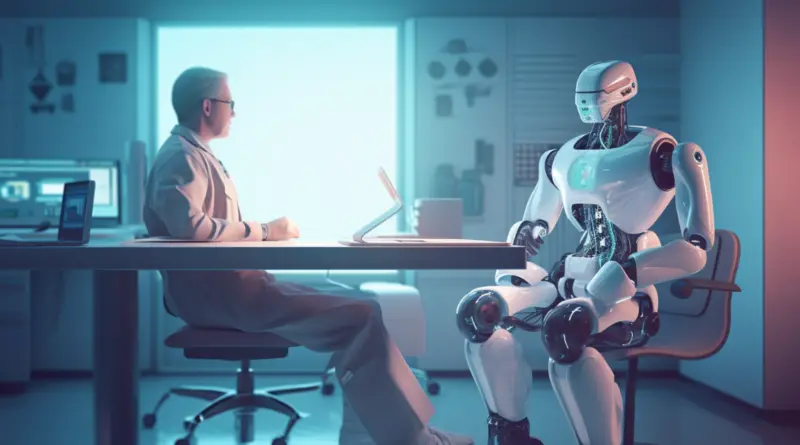The Truth About ChatGPT’s Medical Advice: Can It Be Trusted?
We’ve all been advised not to do it, but let’s face it, who hasn’t Googled their symptoms at least once? comparing cost and convenience and cost, the internet is hard to resist, more so a chatbot like ChatGPT that can provide answers within seconds.
As a technology enthusiast who’s genuinely intrigued by the potential of AI in different areas of our lives including medicine, I completely understand your curiosity and desire to know if you can truly rely on ChatGPT for sensitive issues such as health info.
So in this article, we’ll dig deep into ChatGPT’s capabilities and evaluate the quality of its medical advice as accessed by health professionals. If we’re going to turn to technology for medical guidance, its a no brainer to determine its level of accuracy.
ChatGPT and Its Potential Benefit in Medical Diagnosis
ChatGPT is an AI chatbot that uses the power of advanced natural language processing algorithms to simulate human-like conversations. Its training data consists of a massive amount of text from various sources, which allows it to understand and generate responses in a conversational manner.
So, it is not surprising that it can provide general information about symptoms, diseases, and treatments, making it a potential tool for quick medical reference. For example, let’s ask ChatGPT about the common symptoms of a cold and assess its response.
Cross-checking the result with that of reliable health information sources like the Mayo Clinic and Cleveland Clinic, I would say its output is pretty impressive. It also added a disclaimer and ask users to consult appropriate medical advice which is good.
“It’s important to note that symptoms can vary among individuals, and some people may experience more severe symptoms than others. Additionally, cold symptoms typically develop gradually and improve within a week to 10 days. If you’re experiencing severe symptoms or if your symptoms persist or worsen, it’s advisable to consult a healthcare professional for an accurate diagnosis and appropriate advice.”
According to a study published in the National Library of Medicine, the precision of ChatGPT’s medical responses was assessed by presenting 284 medical questions to physicians from 17 different specialties.
The answer the chatbot provided was rated on a scale from 1 (completely incorrect) to 6 (completely correct). Impressively, ChatGPT achieved a median score of 5.5, indicating an accuracy rate of approximately 92%.
In addition, Dr. Rigved V. Tadwalkar from Providence Saint John’s Health Center describes ChatGPT as primarily an informational tool rather than a diagnostic tool that can provide definitive advice as desired by most individuals.
“While it serves as a valuable resource for information in many instances, it falls short of being a comprehensive solution because it hasn’t reached that level of capability yet”.
Dr. Rigved V. Tadwalkar
Contextual Understanding and Empathy in Medical Diagnosis
While ChatGPT is impressive, it lacks true human understanding and empathy. It may struggle to grasp the nuances of certain situations or emotions, potentially leading to misinterpretation of queries.
One user might ask, “ChatGPT, I’ve been feeling down lately. What should I do?” The chatbot may provide general advice without fully comprehending the user’s emotional state which medical professionals are trained put into consideration.
Another limitation is the inability of ChatGPT to consider individual patient factors. Healthcare is deeply personal, and factors like age, medical history, and lifestyle can significantly impact treatment decisions.
ChatGPT, however, lacks the ability to gather such details and provide tailored advice. It’s like asking a chatbot for a shoe size recommendation without mentioning your foot measurements, you won’t get a perfect fit.
Biases in Health Advice Based on Trained Data
ChatGPT’s reliability heavily relies on the quality and diversity of its training data. Understanding the sources that contribute to its knowledge base is crucial. OpenAI, the organization behind ChatGPT, makes efforts to ensure a wide range of sources, but biases can still exist.
Again, while ChatGPT may have access to a vast amount of medical literature, it may not always align perfectly with current medical best practices.
Yes, good prompt engineering can improve its accuracy, however, it’s important to remember that individual experiences may vary, and it’s not a substitute for rigorous scientific evaluation.
Guidelines for Using ChatGPT for Medical Queries

If you must use ChatGPT or any other chatbot for medical queries, here are some guidelines you should adhere to.
Set Realistic Expectations
When using ChatGPT or any other chatbot for medical queries, it’s important to set realistic expectations. While AI chatbots have come a long way, they are still limited in their understanding and contextual analysis.
Remember that they are not a substitute for professional medical advice from qualified healthcare providers. Treat them as a helpful resource to gather preliminary information and insights, but not as the final authority on your health concerns.
Verify Information with Reliable Sources
Always cross-reference the information provided by the chatbot with reliable sources. Medical guidelines, reputable healthcare websites, and peer-reviewed research papers are excellent sources of accurate and up-to-date information.
There’s also the good old option of calling your doctor or other certified health care provider.
Chatbots may not have access to the most recent developments or may present biased information, so it’s essential to double-check the facts before making any decisions based on their responses.
Use Clear and Specific Language
When interacting with a chatbot like ChatGPT, use clear and specific language to ensure the best possible response. Avoid using jargon, slang, or ambiguous terms that may lead to misunderstandings.
The clarity in your queries can help overcome some of the limitations of AI chatbots’ contextual understanding.
Exercise Caution in Urgent or Emergent Situations
In urgent or emergent medical situations, never rely solely on ChatGPT for guidance. Time-sensitive conditions require immediate attention from healthcare professionals. If you’re experiencing severe symptoms, injuries, or emergencies, contact your local emergency services or visit the nearest healthcare facility.
Chatbots are not equipped to handle critical situations and may not provide the timely assistance you need.
Report Inaccurate or Harmful Advice
If you encounter inaccurate or potentially harmful advice from a chatbot, report it to the appropriate authorities or the organization behind the chatbot.
By providing feedback, you contribute to the ongoing improvement of AI chatbots’ accuracy and reliability. Reporting any discrepancies ensures that other users are less likely to be misled by incorrect information in the future.
The Future of AI Chatbots in Healthcare
The field of AI is rapidly evolving, and advancements are being made to improve the accuracy and reliability of AI chatbots like ChatGPT. Ongoing research and development aim to address the limitations we discussed earlier.
As technology progresses, we can anticipate these generative AI tools becoming more capable of providing accurate and personalized medical advice.
As AI platforms become more prevalent in healthcare, it is essential to address ethical considerations and privacy concerns. Striking a balance between convenience and protecting sensitive medical information is crucial.
Developers and organizations need to ensure robust privacy measures and adhere to ethical guidelines to maintain user trust.
Finally, I am of the opinion that AI chatbots have the potential to complement and enhance human expertise in healthcare. Collaboration can lead to improved patient care and outcomes.
Integrating AI into clinical workflows and ensuring effective human oversight can maximize the benefits while still minimizing risks.
Related Posts:
Can Teachers Tell if You Use ChatGPT? [Students, Take Note]




